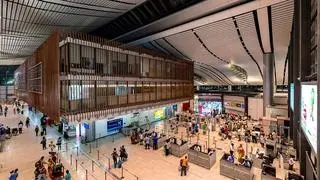The Indian aviation industry is grappling with an unprecedented situation of supply-demand mismatch in these times of Covid-19 pandemic. Vinod Kannan, Chief Commercial Officer (CCO) of Vistara, shared his views with BusinessLine on the opportunities and challenges that Vistara has been facing as a private full-service carrier, and on how higher fuel costs are turning to be a dampener for the Indian aviation industry. Edited excerpts:
What fixed-cost elements are you trying to reduce?
The situation is very fluid and it’s still not something that we believe is, in any sense, normal. The costs related to safety measures have increased, but on the other hand, cutting on F&B has balanced it out marginally. Unfortunately, whatever cost reduction is there, somehow its gets negated by a very hefty fuel price increase, which has increased almost 100 per cent from day one of operations.
Industry sources claim that your lease costs are approximately 15 per cent higher than those of your peers. How are you planning to reduce that?
Now, of course, since our costs are a little higher than others’, there is a little added pressure, but a lot of that cost on the unit basis is also because of the seat layout. Low-cost carriers have 180 seats, unlike our aircraft, which have 164 seats. The problem with these contracts is that they are watertight in most cases. However, those discussions are taking place with the lessors.
Recently, Vistara had said that it is planning to review your delivery of aircraft, but won’t it invite penalties?
If you look at it with a medium- to long-term perspective, there is no doubt we are renegotiating for the aircraft. We believe that demand will actually go up for operators from India to international destinations. So, there’s definitely a lot of potential.
Now, as for penalties and other aspects of the contract, we are actually taking delivery of our second aircraft. So, there’s nothing in that as far as the second aircraft is concerned, but the third, fourth, fifth and sixth aircraft are at different stages of production on the assembly line. We have to also discuss with Boeing when these will be ready, and when we will be in a position to accept them, because, remember, after the aircraft comes in, we also require a certain level of training and internal operations domestically for pilots to be able to fly internationally.
Will you be putting your international expansion plans on hold for some time? Is there a timeline by when you plan to resume these operations?
The original plan of the wide-body aircraft for long-haul operations to Europe would have been much earlier, sometime around May-June. All that has been deferred to the end of this year.
With many international airlines going belly up and slots falling vacated, isn’t this a great time for you to take up slots?
Yes, that is something we are pursuing. There is no doubt that there are opportunities there, but when it comes to international flights, unlike the domestic scenario, it requires the two governments to also be in sync. We need open borders and allow people from both countries to fly freely. Example, UK is one of those places where we’ve always wanted to fly. Heathrow slots are the most valuable, but if an Indian has to fly to the UK, he has to be in quarantine for 14 days. In that situation, how many people are going to fly?
What are the immediate measures you will take to stay afloat? Would you be pumping in cash or looking at consolidation partnership codeshares with national, regional or international airlines?
We do have a very strong pedigree with the Tatas and Singapore Airlines. So, that counts for a lot in terms of branding, and in terms of customers’ faith in us. What we’ve also seen is that as a single airline, which can provide both long-haul and domestic flights, I think we will have a better opportunityto capture a bit more of the market share of both, because not many airlines in India can do that at the moment.
Cash funding and money are at the top of everyone’s mind. That’s regardless of the partnerships we have with different airlines. There are very specific requirements for cash, whether it’s for aircraft payment or for working capital; so, those efforts will continue.
In the short term, would you pivot towards domestic operations? Would you go regional or even hyper local?
Since domestic quarantine norms are easier to deal with, the focus will be on domestic travel as we have seen some potential in the last few weeks of operations. Whether that continues and which segments will continue ― that’s a blur at the moment.
The second step, I think, would be neighbouring countries, places like Kathmandu, Dubai, Singapore. All these places are probably the next (destinations) for growth, given that we have agreements and bilaterals with these cities.








Comments
Comments have to be in English, and in full sentences. They cannot be abusive or personal. Please abide by our community guidelines for posting your comments.
We have migrated to a new commenting platform. If you are already a registered user of TheHindu Businessline and logged in, you may continue to engage with our articles. If you do not have an account please register and login to post comments. Users can access their older comments by logging into their accounts on Vuukle.